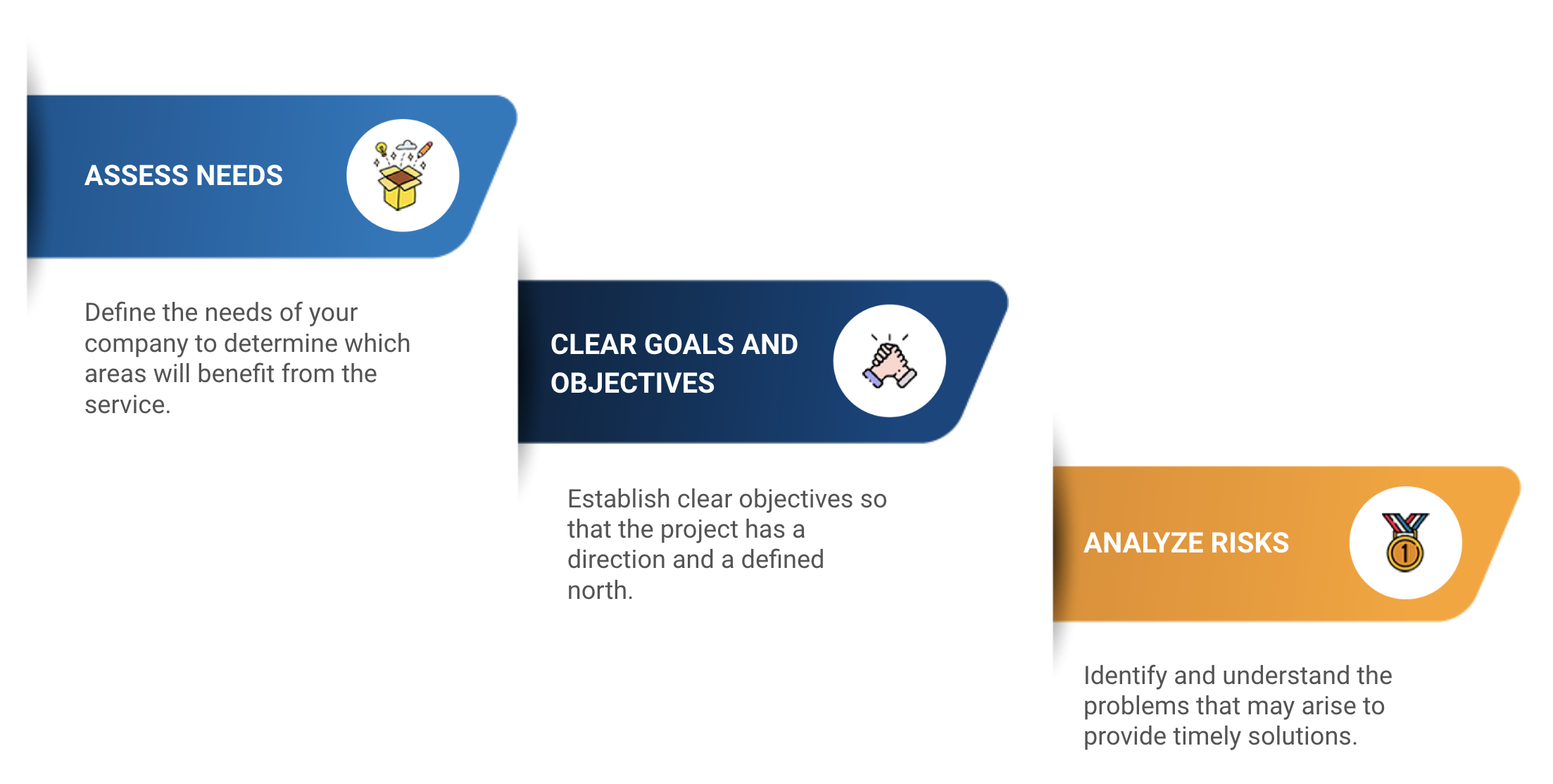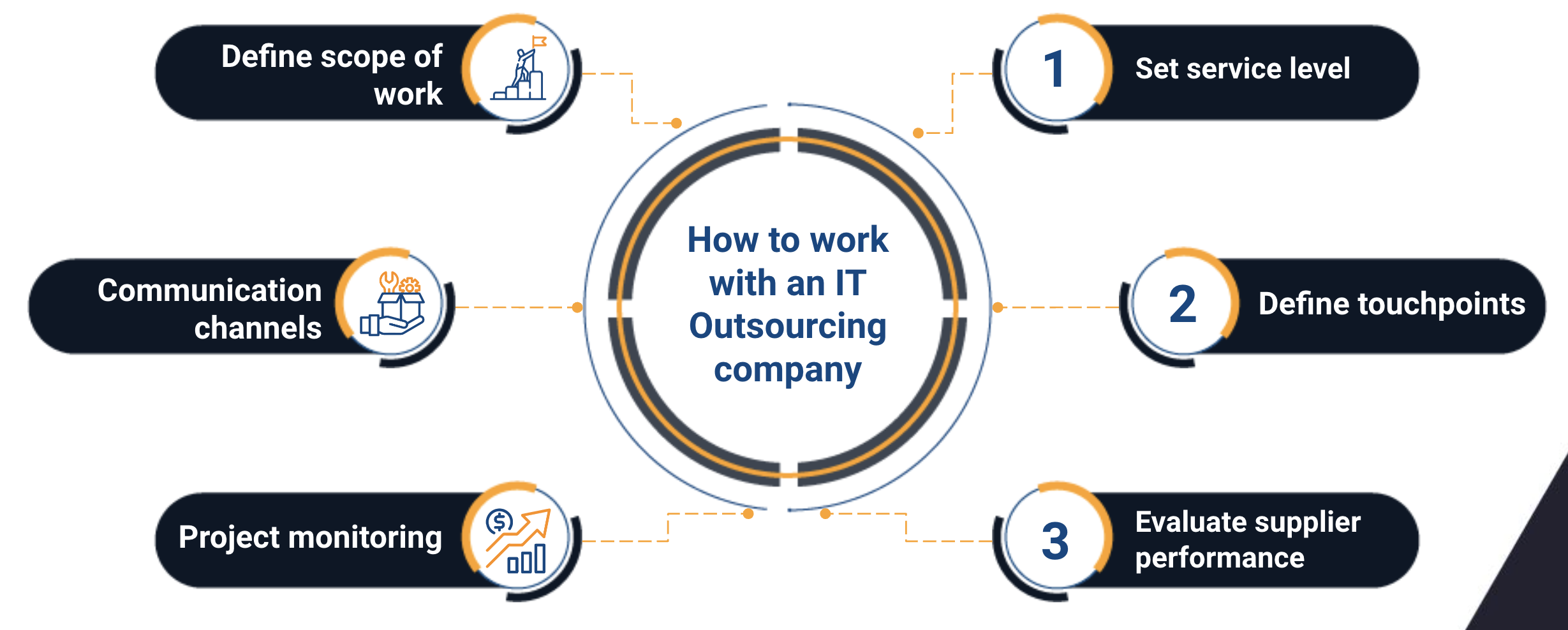
Many businesses around the world have chosen to work with IT outsourcing companies for the wide variety of high-quality technology services they offer. They are great allies for businesses that do not have the necessary resources or capabilities to develop their own software projects.
These companies are in charge of managing the entire software life cycle, from requirements analysis to maintenance and updating. The influence and importance of IT outsourcing companies in the development of software projects is increasing, due to the advantages they offer both for clients and suppliers.
On the one hand, clients can access qualified professionals, reduce costs and risks, improve quality and efficiency, and focus on their core business. On the other hand, providers can expand their customer base, diversify their services, increase their income and optimize their resources.

Before choosing the IT outsourcing company, work through these stages
We have +12 years of experience in the technology industry, working with global companies and we know first-hand how difficult it can be to start looking for an IT outsourcing company to work with.
It can be a challenging task, therefore, here we will explain the first stages that you must go through so that the search for that IT outsourcing company is effective and productive.
Step 1: Assess the needs of your company
Before seeking the help of an IT outsourcing company, it is essential to carry out a thorough assessment of the needs of your company, only then will you be able to identify the specific areas of your business that benefit the most from outsourcing, as well as establish clear goals and objectives for the project.
You can start this stage by analyzing the internal activities and functions of your company that could be executed by an IT outsourcing company. This could include areas such as software development, technical support, network administration, database management, or information security.

Step 2: Set clear goals and objectives for outsourcing
Every project needs a direction to follow and even more so if you are going to work with an IT outsourcing company. Clear goals and objectives should be established when working with a software service provider, so that the project has a clear framework and direction. This will avoid many misunderstandings in the future and is a way to guarantee the fulfillment of the expected results of the project.
Businesses should also be clear about what they hope to achieve from the IT outsourcing company, whether it be improvements in operational efficiencies, cost reduction, access to specialized resources, greater focus on the company's core competencies, or greater flexibility and scalability in the delivery of IT services.
Goals should be specific, measurable, achievable, relevant, and time bound (SMART). For example, a SMART goal might be "Reduce operating costs by 20% in the next 12 months by outsourcing IT help desk."
Step 3: Assess the risks associated with outsourcing and how to mitigate them
It is wise to anticipate problems, especially in the area of technology, since this saves time and money. For this, it is necessary to evaluate the risks associated with IT outsourcing, to identify and understand the problems that may arise, and thus be able to provide timely solutions. Some common risks include loss of control over IT assets, information security, service quality, and third-party provider dependency.
To mitigate these risks, various strategies can be implemented. First of all, it is essential to carry out a rigorous evaluation and selection of the IT outsourcing company. This involves researching their experience, reputation, and technical capabilities, as well as evaluating their security and regulatory compliance record. By choosing a reliable provider and establishing strong contractual agreements, you reduce the risk of poor quality of service or failure to meet agreed requirements.
In addition, it is essential to establish clear information security policies and procedures. This implies defining security standards, implementing data protection measures and establishing risk management protocols. Likewise, confidentiality and security agreements must be established with the provider, ensuring the protection of the company's intellectual property and sensitive information.
Guide to working with an IT outsourcing company and for the collaboration to be successful
- Define expectations and scope of work
It is important to clearly establish what you hope to achieve with the service of the IT outsourcing company and what the exact scope of work is. Define your objectives, requirements and expected results precisely, this will help the IT outsourcing company to understand your needs and offer you appropriate solutions.
- Establish clear and measurable service level agreements (SLAs)
Service level agreements are contractual documents that specify the performance and quality standards you expect from the IT outsourcing company. Make sure you establish clear and measurable SLAs that address things like response time, availability, quality of service, and problem resolution. This will provide a solid basis for evaluating the provider's performance.

- Establish effective and frequent communication channels
Fluid and effective communication is key to the success of outsourcing. Establish clear communication channels, such as regular meetings, email, or online collaboration tools. This will ensure that both parties are aligned, updates are shared, and issues are resolved in a timely manner.
- Assign an internal contact point for coordination and communication with the supplier
Designate one person in your organization as the primary point of contact for the IT outsourcing company. This person will be responsible for coordinating and supervising the project, facilitating communication between both parties and ensuring efficient management.

- Establish a system for tracking and monitoring the progress of the project
Implement a system to track and monitor the progress of the IT outsourcing project. This may include the use of project management tools, regular status reports, and the definition of milestones and key deliverables. Maintaining an adequate follow-up will allow to identify any deviation and take timely corrective measures.
- Conduct periodic reviews and evaluate supplier performance
Schedule regular reviews with the IT outsourcing company to assess their performance. Analyze if the agreed SLAs are being met, review the progress of the project and provide constructive feedback. These reviews will allow for adjustments if necessary and ensure effective collaboration over time.
By taking these points into account when hiring an IT outsourcing company, you will be establishing solid foundations for a successful relationship and mutually beneficial collaboration. At Rootstack, we have +12 years of experience supporting companies in their digital transformation. Contact us!


